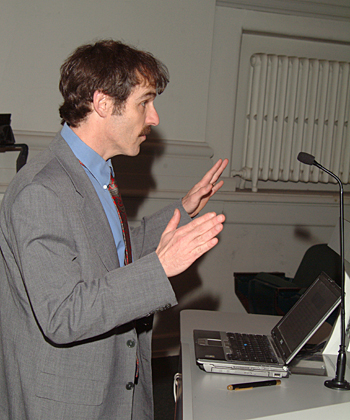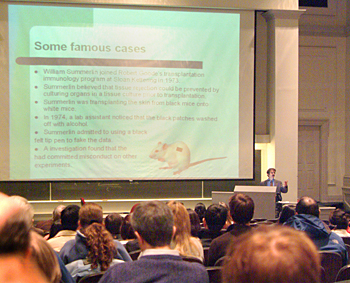
Co-sponsored by the University of Delaware Chapter of Sigma Xi and the Research and Graduate Studies Office, Resnik's lecture, “Misconduct in Research--What It Is, Why It Happens, How to Deal with It and How to Prevent It,” was preceded by a catered reception and introductory speech by Stanley Sandler, Henry Belin du Pont Professor of Chemical Engineering, and included a slide show to illustrate the finer points of what research misconduct really is.
“Usually, when a misconduct finding happens, the government just agrees that the researcher or researchers will not receive funding for a specific duration of time--say, another five years,” said Resnik, after opening his lecture with a summary of several notorious cases of flawed or fraudulent scientific research over the past 30 years. “However, there is the possibility that when you commit misconduct, you could be held liable for civil fraud or criminal fraud, because basically what you are doing is deceiving the government.”
Resnik elaborated on this by citing the historical case of research misconduct by nationally recognized drug therapy researcher, Stephen E. Breuning, who in 1988 became the first scientist to be prosecuted, fined and incarcerated for falsification of scientific research.
Because a large part of research funding for major scientific experiments typically comes from government-affiliated agencies, such as the National Science Foundation (NSF) and the National Institutes of Health (NIH), Resnik said that as more high-profile cases of flawed research came to light in recent years, the government began to look more closely at its definition of misconduct.
The 1986 Thereza Imanishi-Kari case (a case which also involved Nobel Prize-winning biologist David Baltimore and eventually resulted in their exoneration), and the 2006 convictions of American medical scientist Eric Poehlman, and South Korean biomedical scientist Hwang Woo-Suk, Resnik said, were three key research misconduct incidents in recent years that caused the United States government to tighten its definitions of--and its penalties for--fraudulent research.
“In terms of South Korea, this was a problem for them, because they didn't really have a proper procedure in place for investigating research misconduct,” Resnik said.
Because the internationally respected journal Science had been the first to publish Hwang Woo-Suk's findings, however, Resnik said, and because all major scientific breakthroughs have a worldwide impact, Hwang Woo-Suk's research caused the American Association for the Advancement of Science (the organization that publishes Science) to rethink its policies.
“They were ashamed that something as obvious as [the flawed data presented by Hwang Woo-Suk] should have slipped through,” he said. “And so their new policy stated that really high-impact papers would be given extra scrutiny.”
NIH also adopted a more cautious approach, Resnik continued, and in the wake of Poehlman's debunking, a debate ensued in the United States about the definition of research misconduct and about preventive measures.
“As a result of this debate, the 'serious deviation' terminology in the existing federal definition of research misconduct was eliminated as too general and too difficult to police,” Resnik said. “So they turned the focus to the three terms of fabrication, falsification and plagiarism.”The federal definition of research misconduct, finalized in 2005 and accepted by almost all federal agencies, Resnik emphasized, now not only is more watertight, but also covers more ground, including at the outset in grant proposals, where the rules also apply.
“The new definition really covers a lot of areas of research,” Resnik said. “It now states that 'research misconduct means the fabrication, falsification or plagiarism for proposing, performing or reviewing research, or in recording research results.' Misconduct does not, however, include honest error or differences of opinion.”
That is important, Resnik said, “because sometimes there have been constructive disputes of methodologies.”
At NIEHS, which is part of the National Institutes of Health, Resnik coordinates several ethics programs and helps develop institutional policies that promote research integrity and compliance with federal research policies and regulations. He assists researchers and administrators with ethics issues and concerns and is also vice chair of the NIEHS Institutional Review Board.
Additionally, he conducts interdisciplinary research on ethical, legal and social issues in environmental health, spanning such areas as environmental toxicology, environmental genomics, public health, biotechnology, bioterrorism, HIV/AIDS, genetic testing, gene therapy, stem cell research, drug development, medical decision-making and scientific methodology.
Resnik holds a master's degree and a doctorate in philosophy from the University of North Carolina at Chapel Hill and a law degree from Concord University and has authored more than 100 articles on various topics in philosophy and bioethics, as well as six books. He serves on several editorial boards and is an associate editor of the journal Accountability in Research.
Article by Becca Hutchinson
Photos by Greg Drew


